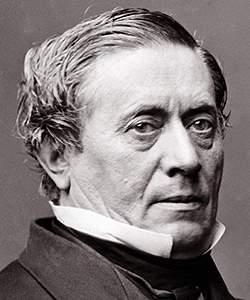Joseph Henry (American National Bibliography)
Scholarship
Contemporaries often compared Henry to Benjamin Franklin (1706-1790). Like Franklin, Henry became a larger-than-life symbol of American accomplishment in science. At the end of the nineteenth century, Henry was enshrined as one of the sixteen representatives of human development and civilization memorialized in the Main Reading Room of the Library of Congress, along with such notables as Isaac Newton, Herodotus, Michelangelo, Plato, and William Shakespeare. His name was given to the standard unit of inductance. There arose a hagiographic literature written by scientists and engineers that treated Henry as the father of modern electrical technology and an isolated example of American excellence. He was renowned as the greatest American physicist of the mid-nineteenth century.
In the late twentieth century, historians have shifted their focus to Henry's role as a leader of American science and as an institution builder. Without denying that he was America's foremost scientist in the 1840s, they view his success as an experimenter as important not only because of the discoveries he made, but because these discoveries gave him the prestige and respect necessary for success as a science administrator and spokesman.
In the late twentieth century, historians have shifted their focus to Henry's role as a leader of American science and as an institution builder. Without denying that he was America's foremost scientist in the 1840s, they view his success as an experimenter as important not only because of the discoveries he made, but because these discoveries gave him the prestige and respect necessary for success as a science administrator and spokesman.
Marc Rothenberg, "Henry, Joseph," American National Biography Online, February 2000, http://www.anb.org/articles/13/13-00739.html.





